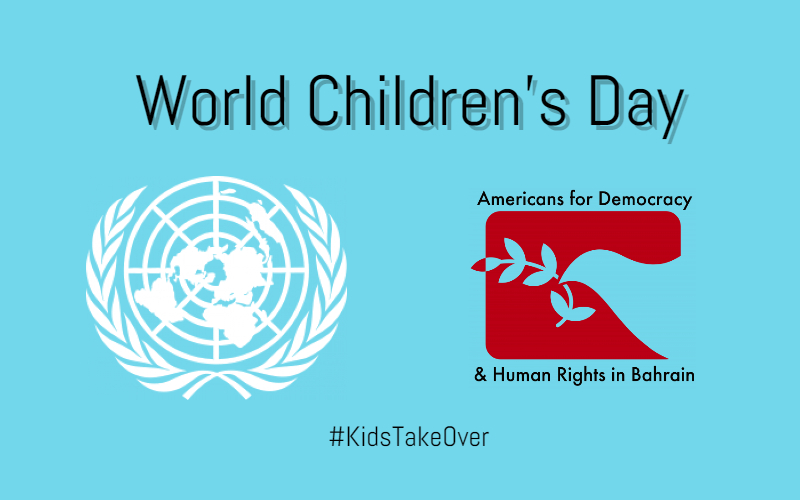Today, 20 November 2017, marks the 63rd celebration of the United Nations (UN) Children’s Day. Established in 1954, World/Universal Children’s Day aims to encourage and empower children across the world, to promote international togetherness and awareness among children, and improve children’s welfare. Today also serves as the anniversary of the adoption of the UN Declaration of the Rights of the Child, and the UN Convention on the Rights of the Child in 1959 and 1989 respectively.
This campaign seeks to shed light on the impact of international conflicts on children. Children are often forced into labor or warfare in times of armed conflict, and are subjected to less-than-optimal standards of living even in times of relative peace. The UN seeks, through this campaign, to bring awareness to the failures of some governments to protect and provide for their children citizens.
During 2017, ADHRB has documented several specific instances of abuse against children in the Arab Gulf, particularly in Saudi Arabia and Bahrain. In the cases of the Saudi citizen Sajjad Mohammed Al AbuAbdalla, and Bahraini citizens Mohamed Ebrahim Ali and Ahmed Mansoor Ansaif, the Saudi and Bahraini governments targeted them during counter-terror measures, killing Sajjad and detaining and severely torturing Mohamed and Ahmed.
Sajjad AbuAbdalla was a three-year-old boy who was shot on 12 June 2017 by Saudi security forces while driving with his mother, uncle, and sister through their hometown of Awamiyah in eastern Saudi Arabia. The family was on their way to Sajjad’s maternal grandparents’ house to celebrate Ramadan and break the day’s fast. As their car passed the Awamiyah police station, the sound of gunfire rang out. As the car drove away, Sajjad’s mother saw that Sajjad was slumped over and realized he was bleeding. A bullet had pierced the door next to Sajjad and passed through his wrist and abdomen. He suffered greatly for the next two months before he died on 9 August. Since his death, Saudi officials have done nothing to effectively investigate who murdered the child. Eyewitness testimony has either not been taken or has simply been disregarded, and the Saudi government asserts without any presentation of evidence that those responsible were “terrorists” operating in the area.
Mohamed Ebrahim Ali and Ahmed Mansoor Ansaif were sixteen-year-old Bahraini high school students at the time of their separate arrests. Mohamed was home alone with his mother when masked, civilian-clothed men barged into his home at 6:00 AM on 22 July 2017 without a warrant and took him away. One officer involved wore a badge with the insignia of the Ministry of Interior (MoI), the government agency most often implicated in house raids. Mohamed was arbitrarily arrested and security forces tortured him and forced him to sign a false confession. Ahmed had a similar ordeal: he was also detained on 22 July 2017 after over a dozen men violently forced their way into his family home. The agents were likely affiliated with the MoI and they did not present a warrant for Ahmed’s arrest. Security forces initially did not charge Ahmed with any offense, but they later presented charges that directly violate his right to free expression and assembly. He, like Mohamed, was tortured by security forces while in detention.
Both Saudi Arabia and Bahrain are signatories to the UN Convention on the Rights of the Child: Bahrain acceded to the Convention in 1992, while Saudi Arabia acceded to it in 1996. As parties to the Convention, both Bahrain and Saudi Arabia have pledged to protect the rights of children, including their right to free expression (Article 13) and free association and assembly (Article 15). Further, both Saudi Arabia and Bahrain are bound by the Convention to not subject children to torture or other cruel, inhuman, or degrading punishment (Article 37) In their treatment of Sajjad, Mohamed, and Ahmed, Saudi Arabia and Bahrain have blatantly disregarded their international treaty obligations.
Americans for Democracy & Human Rights in Bahrain (ADHRB) joins the UN in its observance and celebration of World Children’s Day. We encourage the governments of Bahrain, Saudi Arabia, and other GCC states to reaffirm their commitments made in their signings of the UN Declaration of the Rights of the Child and the Convention on the Rights of the Child. These governments must be held accountable for their treatment of children across these kingdoms. The legal loopholes that allow for various forms of mistreatment, such as child labor and early marriage, must be closed in the Middle East and around the world. The children of today are the leaders of tomorrow, and they must be protected.





